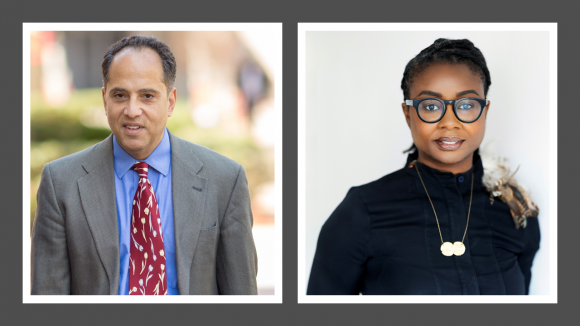
Clinical Dean Jon Dubin, left, and Professor Norrinda Hayat, will be directing the two new clinics.
Rutgers Law School’s Clinical Program has created two new clinics: a Housing Justice and Tenants’ Solidarity Clinic and an Economic Justice and Public Benefits Clinic, to better serve clinic clients, particularly those in the greater Newark Community, and to better define clinical offerings for law students.
The two new clinics will replace the former Civil Justice Clinic, that was co-taught by Professor Norrinda Hayat and Clinical Dean Jon Dubin, and increase the number of in-house, real-client clinical offerings directed by full-time faculty in Newark to twelve.
Hayat, who has worked diligently to halt evictions for New Jersey residents, particularly during the pandemic, will lead the Housing Justice and Tenants’ Solidarity Clinic. The clinic, which will be open to third-year law students, will represent lower-income clients and client groups on housing and spatial justice issues, including fighting evictions, challenging housing discrimination, helping persons and families confronting homelessness, and challenging displacement and gentrification due to the loss of affordable public and subsidized housing.
In the spring of 2020, Hayat urged the governor to impose a moratorium on evictions, Hayat and her housing partners - Newark-based housing activist Victor Monterrosa RLAW ’15 and Nina DePalma, RLAW ’20, who started the Newark Housing Coalition - organized a “Twitterstorm”, calling on New Jersey’s Governor Phil Murphy to institute a moratorium on evictions in the state. Sample tweets were sent out to community partners, clients, and members of the law school community. All of those involved began tweeting at the governor at the same time – 3pm – one afternoon. The next day, March 14, evictions in New Jersey were halted. She also has been working with housing advocates to support a multiplicity of efforts that would provide rent relief to New Jersey residents.
Hayat has also recently launched an Eviction Diversion Project with a $1.1 million state grant to address the potential flood of eviction proceedings due to the end of the eviction freeze necessitated by the COVID-19 pandemic, and the problem of large rental arrearages accumulated in that time period. This project will be subsumed within the new Housing Justice and Tenants’ Solidarity Clinic.
The second new clinic, the Economic Justice and Public Benefits Clinic will represent lower-income clients and client groups in cases involving public benefits – principally the federal Social Security and Supplemental Security Income (SSI) Disability Benefits programs but also some issues involving state public assistance cash-benefit social welfare programs; Supplemental Nutrition Assistance Program (SNAP) and other food/nutrition programs; and unemployment compensation. The clinic will also pursue challenges to inequitable and excessive fines and fees and other practices undermining the economic well-being of low income persons and families.
Dubin is an expert in Social Security Disability law and an author of several books on the topic and multiple law review articles cited by the U.S. Supreme Court. He teaches a classroom course in Social Security Law. He also created and teaches a course in Poverty Law to address economic and distributive justice in law more broadly and will address some issues in that course, in the new clinic. He will lead third-year clinic students in direct client service in formal federal court appeals, administrative hearings with cross-examinations of expert witnesses, and in many forms of less formal client work and administrative advocacy, and in some projects pursuing broader law reform.
According to Dubin, “the new clinics reflect reorganizations and expansions of the existing Civil Justice Clinic to better reflect our clinical representation of low income clients in issues involving housing and other basic human needs and life necessities in these times, and to provide greater clarity for law students, clients and community partners alike of what we do and can do.”
Both clinics will work cooperatively with the Criminal and Youth Justice Clinic, directed by Professor Laura Cohen. A joint seminar for all three clinics will instruct students in a full range of lawyering skills, including interviewing, counseling, developing case theory, cross-cultural competency, fact investigation, negotiation, witness examination and trial practice skills.
The new clinics go into effect in May 2022.